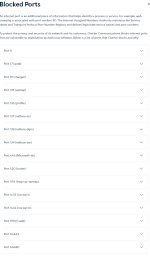Woofer Wrecker
Occasional Visitor
Greetings once again.
I have been going to GRC's Shields Up site for many years, but had not been there in some time, until recently. I run the full scan, and nowadays, ports 89 and 90 are listed as closed, instead of Stealth, which is not how I want the router to behave.
Port 89 is named su-mit-tg and 90 is named dnsix. A telnet gateway and securit map.
I do not knowingly use either service, and would like the router to not respond at all to probes of these ports, like it does for all other service ports.
I have the router configured to act as a VPN, and route all but a few devices through the VPN tunnel.
Is there a way to stealth those 2 ports so they behave like all others?
Router is running Merlin 386.7.
TIA for any suggestions!
I have been going to GRC's Shields Up site for many years, but had not been there in some time, until recently. I run the full scan, and nowadays, ports 89 and 90 are listed as closed, instead of Stealth, which is not how I want the router to behave.
Port 89 is named su-mit-tg and 90 is named dnsix. A telnet gateway and securit map.
I do not knowingly use either service, and would like the router to not respond at all to probes of these ports, like it does for all other service ports.
I have the router configured to act as a VPN, and route all but a few devices through the VPN tunnel.
Is there a way to stealth those 2 ports so they behave like all others?
Router is running Merlin 386.7.
TIA for any suggestions!


